Patient Safety
Infection Control Protocol
Infection is the invasion of an organism’s body tissues by disease causing agents, their multiplication, and reaction of the host tissues to these organisms and toxins they produce.
The protocols which limit the spread of infection include:
- Screening
- Personal Protection
- Antiseptic Technique
- Sterilization & Disinfection
- Waste Disposal
The standard protocols are given by Organizations such as :
- Centre of Disease Control (CDC):
- Guidelines for Disinfection and Sterilization in Healthcare Facilities, 2008
- Guidelines for Infection Control in Dental Health-Care Settings — 2003
- Environmental Protection Agency (EPA)
- National Institute of Occupational Safety and Health Hazards
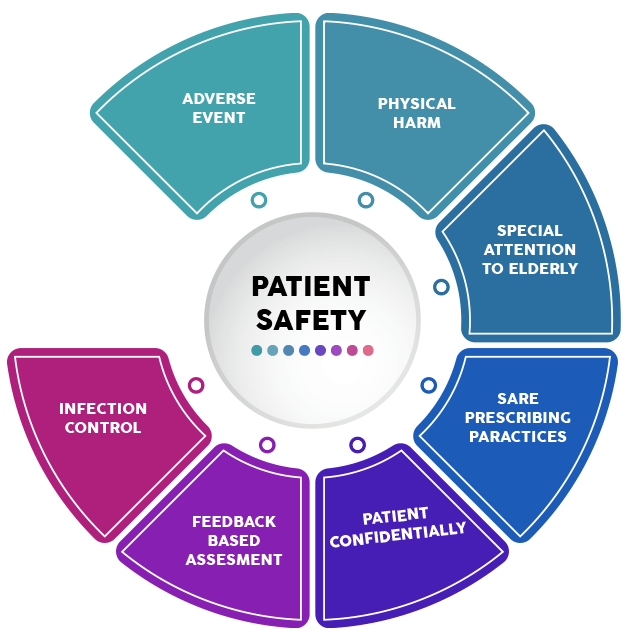
- Infection Control
- Safety Against Adverse Events
- Record Safety
- Physical Harm Protection
- Elderly Friendly Measures
- Prescription Safety
- Feedback based Assessment
INFECTION CONTROL PROTOCOL
Infection is the invasion of an organism’s body tissues by disease causing agents, their multiplication, and reaction of the host tissues to these organisms and toxins they produce.
The protocols which limit the spread of infection include:
- Screening
- Personal Protection
- Antiseptic Technique
- Sterilization & Disinfection
- Waste Disposal
The standard protocols are given by Organizations such as :
- Centre of Disease Control (CDC):
- Guidelines for Disinfection and Sterilization in Healthcare Facilities, 2008
- Guidelines for Infection Control in Dental Health-Care Settings — 2003
- Environmental Protection Agency (EPA)
- National Institute of Occupational Safety and Health Hazards

INFECTION CONTROL PROTOCOL
Infection is the invasion of an organism’s body tissues by disease causing agents, their multiplication, and reaction of the host tissues to these organisms and toxins they produce.
The protocols which limit the spread of infection include:
- Screening
- Personal Protection
- Antiseptic Technique
- Sterilization & Disinfection
- Waste Disposal
The standard protocols are given by Organizations such as :
- Centre of Disease Control (CDC):
- Guidelines for Disinfection and Sterilization in Healthcare Facilities, 2008
- Guidelines for Infection Control in Dental Health-Care Settings — 2003
- Environmental Protection Agency (EPA)
- National Institute of Occupational Safety and Health Hazards

INFECTION CONTROL PROTOCOL
Infection is the invasion of an organism’s body tissues by disease causing agents, their multiplication, and reaction of the host tissues to these organisms and toxins they produce.
The protocols which limit the spread of infection include:
- Screening
- Personal Protection
- Antiseptic Technique
- Sterilization & Disinfection
- Waste Disposal
The standard protocols are given by Organizations such as :
- Centre of Disease Control (CDC):
- Guidelines for Disinfection and Sterilization in Healthcare Facilities, 2008
- Guidelines for Infection Control in Dental Health-Care Settings — 2003
- Environmental Protection Agency (EPA)
- National Institute of Occupational Safety and Health Hazards

INFECTION CONTROL PROTOCOL
Infection is the invasion of an organism’s body tissues by disease causing agents, their multiplication, and reaction of the host tissues to these organisms and toxins they produce.
The protocols which limit the spread of infection include:
- Screening
- Personal Protection
- Antiseptic Technique
- Sterilization & Disinfection
- Waste Disposal
The standard protocols are given by Organizations such as :
- Centre of Disease Control (CDC):
- Guidelines for Disinfection and Sterilization in Healthcare Facilities, 2008
- Guidelines for Infection Control in Dental Health-Care Settings — 2003
- Environmental Protection Agency (EPA)
- National Institute of Occupational Safety and Health Hazards

INFECTION CONTROL PROTOCOL
Infection is the invasion of an organism’s body tissues by disease causing agents, their multiplication, and reaction of the host tissues to these organisms and toxins they produce.
The protocols which limit the spread of infection include:
- Screening
- Personal Protection
- Antiseptic Technique
- Sterilization & Disinfection
- Waste Disposal
The standard protocols are given by Organizations such as :
- Centre of Disease Control (CDC):
- Guidelines for Disinfection and Sterilization in Healthcare Facilities, 2008
- Guidelines for Infection Control in Dental Health-Care Settings — 2003
- Environmental Protection Agency (EPA)
- National Institute of Occupational Safety and Health Hazards

INFECTION CONTROL PROTOCOL
Infection is the invasion of an organism’s body tissues by disease causing agents, their multiplication, and reaction of the host tissues to these organisms and toxins they produce.
The protocols which limit the spread of infection include:
- Screening
- Personal Protection
- Antiseptic Technique
- Sterilization & Disinfection
- Waste Disposal
The standard protocols are given by Organizations such as :
- Centre of Disease Control (CDC):
- Guidelines for Disinfection and Sterilization in Healthcare Facilities, 2008
- Guidelines for Infection Control in Dental Health-Care Settings — 2003
- Environmental Protection Agency (EPA)
- National Institute of Occupational Safety and Health Hazards

INFECTION CONTROL PROTOCOL
Infection is the invasion of an organism’s body tissues by disease causing agents, their multiplication, and reaction of the host tissues to these organisms and toxins they produce.
The protocols which limit the spread of infection include:
- Screening
- Personal Protection
- Antiseptic Technique
- Sterilization & Disinfection
- Waste Disposal
The standard protocols are given by Organizations such as :
- Centre of Disease Control (CDC):
- Guidelines for Disinfection and Sterilization in Healthcare Facilities, 2008
- Guidelines for Infection Control in Dental Health-Care Settings — 2003
- Environmental Protection Agency (EPA)
- National Institute of Occupational Safety and Health Hazards

Methods Of Achieving Sterilization
And Disinfection At Kosmos
Sterilization and disinfection can be obtained by Physical, chemicals radiations and gases. Popular methods include:
Essentials For Sterilization And Disinfection
Moist Heat sterilization under temperature and pressure.
- AUTOCLAVE IN CSSD, SPDC:
- Machine: Swingstar Autoclave
- Cycle Followed:
- Temperature: 121°C
- Pressure: 15 psi
- Time: 15 minutes
- Items Sterilized: Instruments, clothing, glassware, heat resistant plastics.
PREREQUISITES FOR AUTOCLAVING:
- Cleaning:
- Instruments should be thoroughly cleaned with soap water and scrubbed with a brush to remove any visible debris.
- Wash with plain water.
- Dry all instruments.
- Packaging:
- Packaging materials allow penetration of the sterilization agent and maintain sterility of the processed item during storage.
- Wrap clean dry instruments in green cloth bags, or use commercially available sterilization boxes or single-use pouches.
- Handpieces can be wrapped in sterilization pouches.
- Storage:
- Store in a clean, dry, disinfected place.
- Sterilization Verification
- After proper sterilization, it should be verified by change of color of autoclave tape from yellow to black.
Glutihyde (2% Glutaraldehyde) & Exidex (2.45% Glutaraldehyde)
- Packing Size:5L Jar
- Instruments: Heat Sensitive items, Reusable plastic trays.
- Directions for Use: Properly pre-clean instruments & Immerse in Glutaraldehyde in containers with lids
- Immersion Time:
- Total Disinfection: 10-15mins
- Total Sterilization: 10 hours.
- Composition: 3% Cetrimide, 0.3% Chlorhexidine Gluconate.
- Recommended Dilution: For disinfection of clothing and surface
- Add 2 capfuls (30ml) of the liquid to ½ liter of warm water.
- Antiseptic Liquid:
- Composition: 4.8% Chloroxylenol, 9% Terpineol
- Recommended Dilutions: For disinfection of clothing and surface ;
- Add 2 capfuls (30ml) of the liquid to ½ liter of warm water.
- Dettol Multipurpose Hygiene Liquid
- Composition: 4% Benzalkonium Chloride)
- Recommended Dilution: For disinfection of clothing
- and surface; 1 Cap (15ml) to 1L water
- PROTECTIVE CLOTHING:
- Scrubs or aprons
- Scrubs are to be restricted only in clinical areas.
- Use fresh, clean scrubs each day.
- Wash with detergent and a final rinse with
- A solution prepared by adding 1 Cap (15ml) Dettol Multipurpose Hygiene Liquid( 4% Benzalkonium Chloride) to 1L water.
- OR
- A solution prepared by adding 2 Caps (30ml) Savlon (3% Cetrimide, 0.3% Chlorhexidine Gluconate ) to ½ L water.
- OR
- A solution is prepared by adding 1 cap (15ml) Dettol disinfection Liquid (4.8% Chloroxylenol) in ½ L water.
- Use single use disposable
- Dispose in Yellow Dustbin After Use.
- Change gloves after every patient.
- Perform hand hygiene before and after using gloves each time.
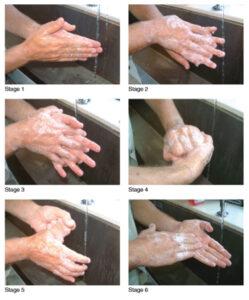
Sterilization And Disinfection Of Instruments Used In Conservative Dentistry & Endodontics
INSTRUMENT | RECOMMENDED PROTOCOL |
|---|---|
1. Diagnostic Instruments: Mouth mirror, probe, tweezers, Explorers | · Clean, Wrap, Autoclave, Store. · Autoclave Cycle Followed: |
2. Kidney Tray | |
3. Cotton Holder, Waste Receiver | |
4. Plastic Filling Instruments | |
5. Burs | Temperature: 121°C Pressure: 15 psi Time: 15 minutes |
6. Rubber Dam (Clamps, forceps, punch) | |
7. Dappen Dish | |
8. Files and Chisels | |
9. Ultrasonic Tips | |
10. Saliva Ejector | |
11. Plastic Instrument Tray | |
12. Endodontic files- K files, H files, Reamers, Broaches, Lentulospirals, GG drills, Peeso reamers | |
13. Endobox | |
14. Endoblock | |
15. Cotton Rolls | |
16. Microsurgical Instruments | |
17. Guttapercha | 2.5% Sodium Hypochlorite |
18. Drape | Cloth : Autoclave Plastic: Clean, wipe with spirit, |
19. Curing Lights, Intra-oral scanners, Intra-oral cammeras | Barrier Protecion: Wrap with clear plastic, clear Cling film |
20. Articulating Paper Holders | Clean, Wrap, Autoclave |
21. Cheek Retractors | Wipe with spirit using sterile cotton, wash, Use |
22. Shade Guide | |
23. Oral Photography Mirror | |
24. Micromotor box with handpiece | Wipe with sterile cotton using: · A solution prepared by adding 1 Cap (15ml) Dettol Multipurpose Hygiene Liquid( 4% Benzalkonium Chloride) to 1L water. OR · A solution prepared by adding 2 Caps (30ml) Savlon (3% Cetrimide, 0.3% Chlorhexidine Gluconate ) to ½ L water. OR · A solution prepared by adding 1 cap (15ml) Dettol disinfection Liquid (4.8% Chloroxylenol) to ½ L water. ü When the surface is visibly contaminated with blood use spirit. |
25. Radiograph Head/Cone | |
26. Elastomeric automated mixing Guns, Pentamix Machine | · Discard Single use Mixing Tips in RED Dustbin. · Wipe with spirit/ Dettol/ Savlon using sterile cotton. |
27. Chairside Lab Instruments: Glass slab, Mixing Spatulas, Carvers, bowls | Clean instruments of any debris, flame metallic part, wipe/ wash handles with disinfectant. |
28. Handpieces: Air rotor Handpiece, Contra-angled Handpieces,Ultra-sonic scaler handpieces | · Discharge air or water from handpiece for 30 seconds. · Scrub the external surface of the handpiece with detergent. · Lubricating the handpiece with commercially available sprays . · Pack in sterilization pouch. · Sterilize in autoclaves (If handpiece is autoclavable) · Sterilize in ETO for other handpieces. |
29. Three way syringe | · Flush internal surface with water and air for 30seconds. · Barrier protection- wrap with cling film or autoclavable cloth which is to be changed for each patient. · Wipe with spirit/ Dettol/ Savlon using sterile cotton. · Tip can be Autoclaved |
30. Magnifying loupes, microscopes | · Ethyl alcohol |
31. Dental units,water pipes & suction systems | · Disinfectants such as iodophore or diluted sodium hypochlorite |
Environmental Disinfection
- Clinical contact surfaces can be directly contaminated from patient materials either by direct spray or spatter generated during dental procedures or by contact with Dentist’s gloved hands.
| INSTRUMENT | RECOMMENDED PROTOCOL |
Dental Chair
| Wipe with sterile cotton using: · A solution prepared by adding 1 Cap (15ml) Dettol Multipurpose Hygiene Liquid( 4% Benzalkonium Chloride) to 1L water. OR · A solution prepared by adding 2 Caps (30ml) Savlon (3% Cetrimide, 0.3% Chlorhexidine Gluconate ) to ½ L water. OR · A solution prepared by adding 1 cap (15ml) Dettol disinfection Liquid (4.8% Chloroxylenol) in ½ L water. ü When the surface is visibly contaminated with blood use spirit |
Dental Chair lights, buttons, instrument holder
| |
Clinician chair
| |
Drawer handles, Pens, Other surfaces touched with gloved hands
| |
Patient Drapes | Cloth Material: Wash, autoclave
|
| Plastic Material: Clean, rinse with dettol/savlon (15ml disinfectant in 1L water) | |
Patient viewing mirrors
| Wipe with spirit using sterile cotton.
|
| Countertops, Washbasin and taps | ü Clean with Detergent. ü When the surface is visibly contaminated with blood use spirit. |
| Patient tumbler | Reusable: Wash with detergent
|
| Disposable: Change for every patient, discard in RED dustbin. | |
| Hand Towel | Wash with detergent, rinse with dettol |
| Spitoons | Scrub and wash with detergent after every patient. |
| Mackintosh sheet | Clean of any debris, Wash with detergent, dry |
| Mobile Phones |
- Housekeeping surfaces (e.g., floors, walls, carpets) have limited risk of disease transmission.
- To be cleaned only with a detergent and water using mops and cloths.
- Household bleach can be used in 1:50 dilution.
- When surfaces are visibly contaminated by blood clean with disinfectant.
- Mops and cloths should be cleaned after use and allowed to dry before reuse.
- Fresh cleaning solutions should be made each day, discarding any that remains and allowing the container to dry between uses.
- Ø Decontaminate all items before they are handled in the lab.
EQUPMENT/ MATERIAL | RECOMMENDED PROTOCOL |
Lathes, Trimmers, bench press, vibrators, rag wheels, Counter tops
| Clean & Scrub with detergent. |
Pressure pots | · Drain water after usage. · Clean & scrub with detergent. · Use disinfectant, if required. |
Lab instruments: wax spatulas, wax Knife, Glass slab, Mixing Spatulas, bowls | · Clean & scrub with detergent. · Use disinfectant as used for clinical contact surfaces if required. |
All brushes, Buffs | · Buffs to be changed daily · Washed with detergent and autoclave daily. · Wet buffs dipped in disinfecting solution when not in use. |
Pumice | · Use pumice mixed with disinfecting solution and surfactant(soap solution) |
ITEM | WASTE DISPOSAL CONTAINER |
Cotton, cotton rolls |
YELLOW Dustbin |
Waste Receiver Contents | |
Teeth, Residual PRF, Bone Graft | |
Gloves, Masks , Head-caps, face-shields | |
Impression material- Retrieved Alginate, Impression Compound | |
Retraction Chord | |
Articulating Paper | |
Special Trays | |
Record bases, bite registrations | |
Old discarded Dentures, Interim Crowns | |
Suction tips |
RED Dustbin |
Syringe without needle | |
Single Use Plastic Impression Trays | |
Automated mixing gun tips | |
Discarded Plastic spatulas | |
Disposable Patient Tumbler | |
Broken discarded metallic instruments- Carvers, Probes, mouth mirrors, wax knife, Metallic Spatula, Lab burs, discarded glass slab |
BLUE Dustbin |
Needle | Destroy in needle destroyer |
Needle hub |
WHITE Puncture Proof container with Sodium Hypochloride |
BP Blades | |
Suture needle | |
Cutter blades | |
Diamond Burs | |
Orthodontic wire | |
Empty material containers |
BLACK Dustbin |
Office waste | |
Lab waste- plaster, Casts, wax | |
Covid Measures
- Patients Entry in The Clinic
- Patients Wating In the Clinic
- Patients in the Clinical Area
- Post Patient Leaving the Clinical Area
- Disinfection Methods for Clinical Areas
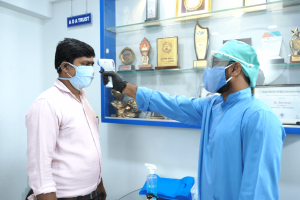
Temerature Check
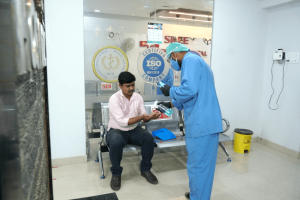
Hand Sanitization using Alcohol based sanitizer
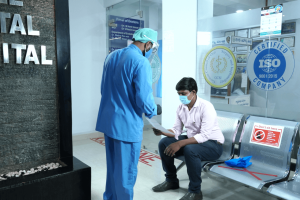
Assessment regarding previous health and travel history
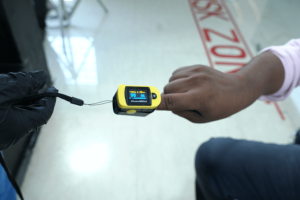
Oxygen Saturation checked using Pulse oximeter
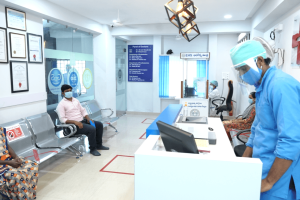
Social distancing protocols followed
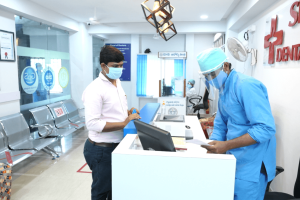
Waiting time no more than 15 minutes
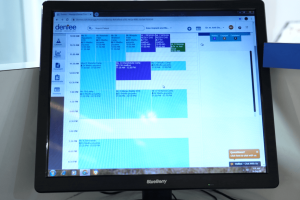
Minimum patient contact with non-clinical staff
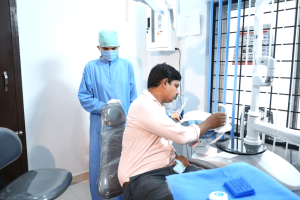
Mouthwash for patient
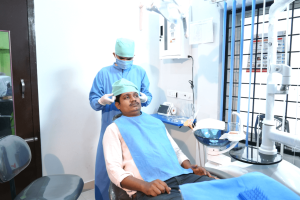
Draping the patient
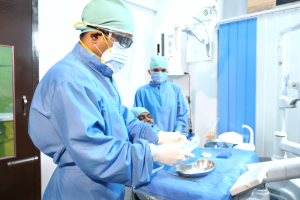
PPE and standard Protection gear for Operator and Assistant
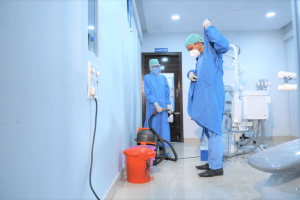
Doffing of PPE and Disinfection using silver halide spray
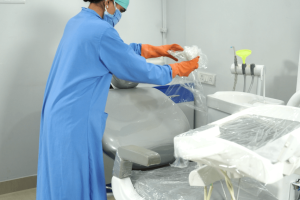
Unwrapping the chair and spraying with Hypochloride solution
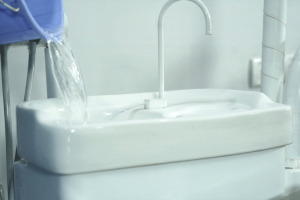
Flushing the waterlines with Disinfectant solution
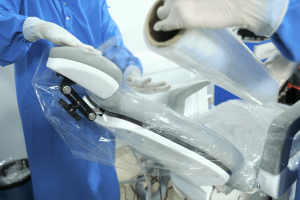
Wrapping the chair with cling wrap for next session
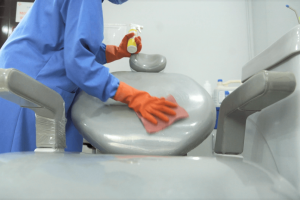
Changing wraps of all the chairs after a wipe down with Hypochlorite solution
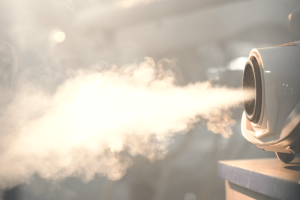
Fumigation using Foggers and disinfectant solution
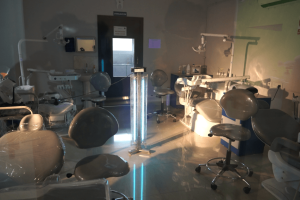
UV light Disinfection for rest of the surfaces
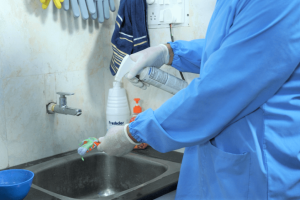
Disinfection of Impression and Models
Kosmo Dental Hospital; a Visionary Dental Hospital with cutting-edge infrastructure, dental equipment and dental devices to ensure optimum quality and safety.
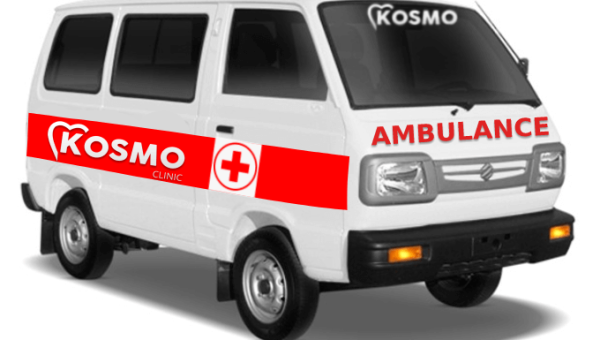
1. Inhouse Ambulance
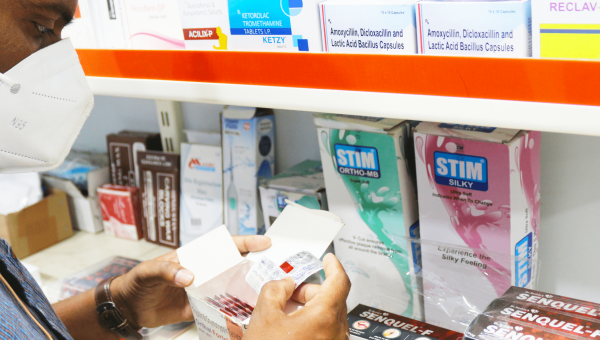
2. Availability of Life saving Emergency Medication
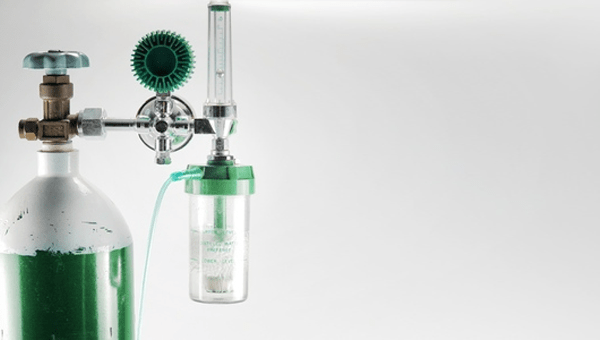
3. Oxygen tanks and Ambulatory masks
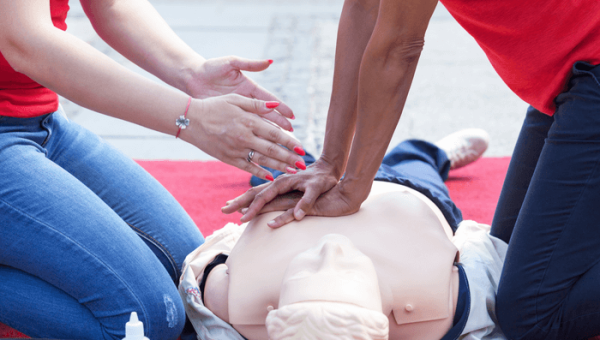
4. All the staff are trained in Basic Life Support (BLS), in accordance with the American Heart Association (AHA) Guidelines
Physical Harm
- Dental instrument Aspiration is one of the accidents dreaded by every clinician, however, there are certain precautions that one can take to prevent any such events.Example of such precautions include:
1.Floss tied to any instrument which has choking hazard.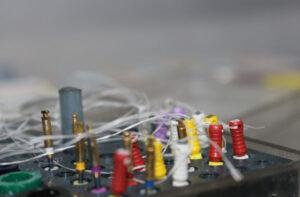
2. All small instruments are counted on their entry and exit from the chair area
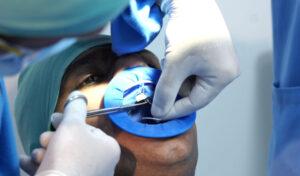
3. Use of Rubber Dam to prevent aspiration.
Our staff is briefed about patient behaviours and thus they are on a lookout for tell-tale signs if any patient is prone to misbehaviour, intentionally or unintentionally. The staff is well equipped to handle such situations and better educated at avoiding them altogether. The staff is strictly advised not to provoke or indulge in conversations which might hurt any person/s sentiment. We believe in caring for patients and treating all of them equally.
Women safety though a sensitive issue needs addressing in any clinical setting. We at Kosmos make sure that women are made comfortable and no environment is created which might cause any discomfort or awkwardness to our patients. Measures such as, A female staff always being there during the treatment and examination of the patient, or presence of a family member while the patient is being treated. The staff is trained adequately to ensure safety and comfort for our female patients. A complaint redressal system is also in place through which the patients can log in their grievances regarding unruly behaviour of any staff anonymously.
Dental Clinic is surrounded with equipment and materials which are inflammable, therefore it is necessary to have a mechanism in place to prevent any outbreak of fire. Kosmos is equipped with fire buffering systems in the building infrastructure. Apart from this there are fire extinguishers in place to counter any mishap. The staff is well trained in fire extinguishing drills. Evacuation plans are well in place in case they are needed.
SPECIAL PROVISIONS FOR ELDERLY ANDPHYSICALLY CHALLENGED
Kosmos is a geriatric friendly clinic, all the facilities provided at Kosmos are designed in accordance with its ease of utility by our dearly elderly patient. Some key highlights are as follows
- Provision of Ramps
- Provision of wheelchair
- Ergonomic Dental Chair for Elderly which provides additional lumbar support.
- Geriatric friendly lavatories
- The clinic is brightly lit and devoid of blind corners which might cause any unfortunate trauma.
- Use of Dental models to explain the treatment more effectively to the elderly.
PATIENT CONFIDENTIALITY
The records are maintained in physical form with the clinic for a period of 5 years as stated by the DCI rules.
- The records are in paper form for 3 months from the date of completion of treatment.
- Post this period the records are digitized and the paper copies are destroyed.
- The patient records are only available to the patient and the treating physician.
Consent is obtained before starting any treatment the patient is explained in detail about the treatment in a language they are familiar with. Dental treatment involves taking photographs for record keeping and sometimes to make promotional material or awareness creating brochures. If a particular photograph is used for any of the above mentioned purposes, a photographic consent is obtained from the patient The Doctor-Patient Confidentiality Clause prevents the doctors or the clinic from sharing any case record with any other entity before a written permission is given by the patient.
Kosmos is evolving and we make our patient advise the basis of our evolution. The stated safety policies are subjected to scrutiny and amendments at all times. The following mechanism is followed to maintain the highest level of PAtient satisfaction
- Randomly patients are asked to review the safety measure and feedback is obtained from them.
- Every month all the safety policies are reviewed by the management and new policies if required are decided and brought into force in the upcoming cycle.
- The staff has to follow a two strike policy, after which they are liable to imposition of penalties or negative credit which affect their appraisal.
PRESCRIPTION SAFETY
Prescription safety is a practise of carefully prescribing any drug to the patient after determining the need, possible interactions, and associated side effects.
- We at Kosmos Follow these rules during prescribing Determine patients past history with any drug, side effects, known allergies.
- Past medical histories and ongoing drugs with which the prescribed drugs might interact in a damaging manner
- We urge our Patients to complete the course of the antibiotics prescribed, as it might develop unwanted resistance to infections later in life.
- The fresh new prescription is issued if the old prescription is to be renewed.
- No over-writing and corrections are allowed on the prescription.
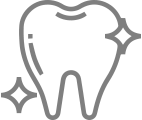
Share your Smile with the World!
dental clinic in Hyderabad. Book your appointment today!

